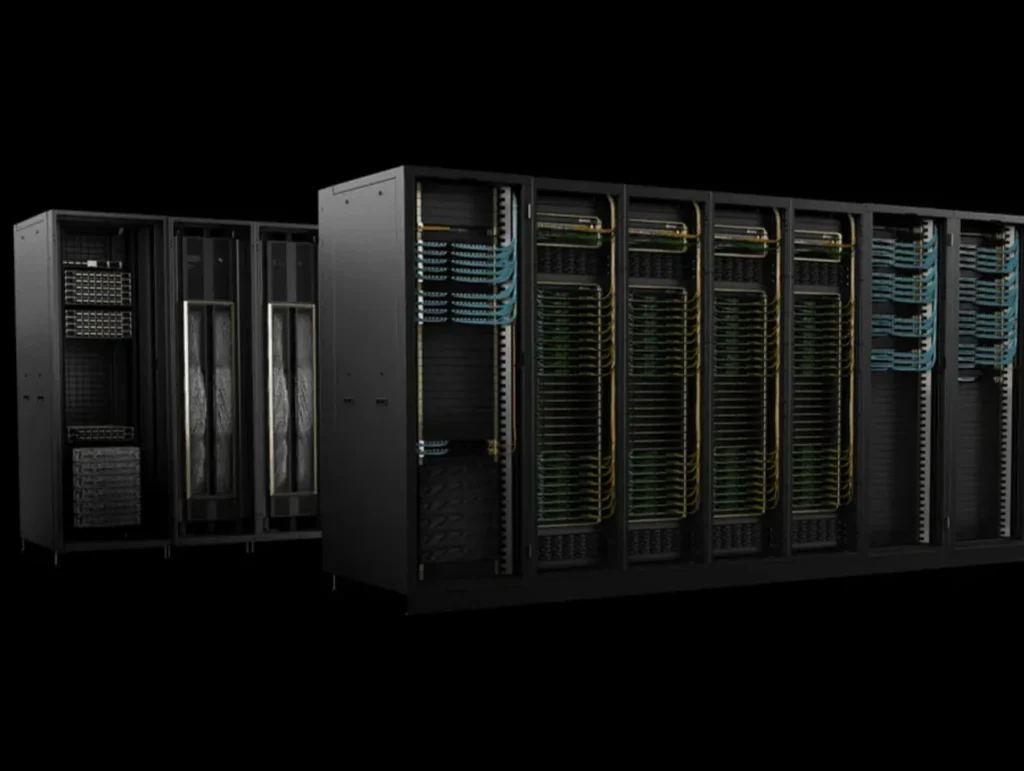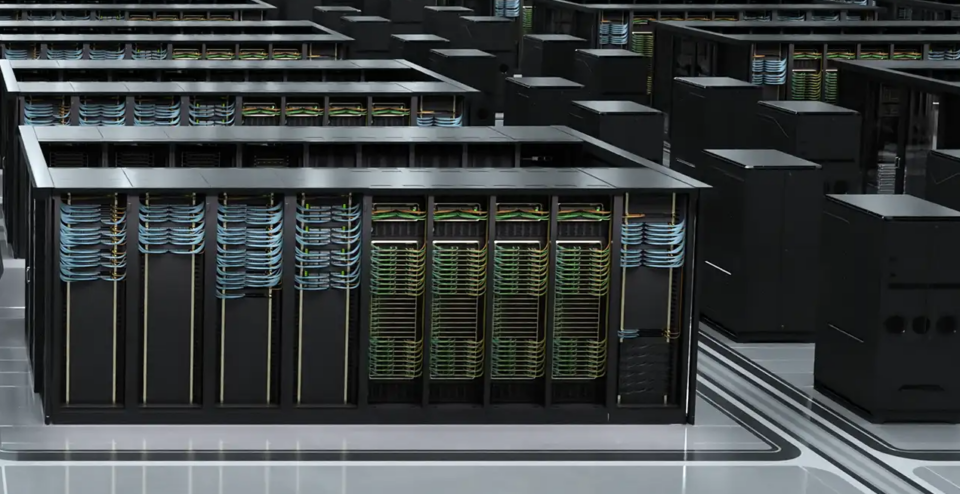Abu Dhabi-based Khazna Data Centres is making a bold move to reshape artificial intelligence infrastructure across the Middle East and Africa (MEA). The company has announced plans to build a series of cutting-edge, Blackwell-ready data halls tailored specifically for NVIDIA’s most advanced chips. This strategic initiative is not only a step forward for the company but a milestone for the region’s digital economy.
In the rapidly evolving world of AI, infrastructure is everything. Compute-heavy workloads require facilities that are purpose-built to handle the intense energy demands, high-density configurations, and advanced cooling systems associated with the latest GPU technologies. By taking the lead in this space, Khazna is helping to build the digital foundations for the next decade of growth.
What does Blackwell-ready mean?
The term “Blackwell-ready” refers to facilities that are designed to host and run NVIDIA’s newest Blackwell architecture GPUs. These chips represent some of the most powerful AI hardware available, used to train massive models, support advanced simulations, and deliver real-time performance for increasingly complex applications.

Running these GPUs at full capacity demands more than just rack space. The electrical and thermal requirements are significant, often reaching levels that standard data centers cannot support. Khazna’s Blackwell-ready data halls will be built from the ground up to address these demands—delivering the power density, cooling efficiency, and connectivity needed to make the most of NVIDIA’s technology.
This isn’t just about adding capacity. It’s about creating a platform where regional governments, corporations, and startups can confidently build the next generation of AI-powered solutions.
Khazna’s transformation into a regional digital enabler
From its origins as a UAE-focused data centre provider, Khazna has rapidly evolved into a key digital enabler across the MEA region. With a portfolio that already includes ten operational data centers and several more under development, the company has built a reputation for reliability, innovation, and sustainability.
This latest announcement shows that Khazna is not content with maintaining the status quo. Instead, it is stepping into a leadership role, anticipating where the market is going and acting decisively to meet future demands. AI adoption is accelerating across all sectors—from finance and energy to healthcare and urban planning—and Khazna is ensuring that the infrastructure is ready to support that momentum.
The company is also aligning closely with Abu Dhabi’s broader technology ambitions. As the UAE continues to position itself as a global AI and digital innovation hub, investments like these send a strong signal to international partners that the region is serious about long-term growth.
Regional expansion and pan-MEA vision
While the initial build-out will be centred in the UAE, Khazna has its sights set firmly on the wider MEA region. New data hall developments are expected in high-growth digital markets like Egypt, Saudi Arabia, Kenya, and Morocco. These markets are seeing rising demand for compute infrastructure that supports cloud, edge, and AI applications—all of which require data to be processed quickly, securely, and locally.
By expanding its footprint, Khazna will be able to provide regional businesses and governments with access to low-latency, high-performance infrastructure that complies with local data sovereignty laws. This is especially important in sectors like banking, healthcare, and public services, where regulations often require sensitive data to remain within national borders.
The benefits go beyond regulatory compliance. By offering NVIDIA-grade infrastructure closer to where the data is generated, Khazna reduces latency, improves reliability, and enhances the performance of AI applications—all key considerations for modern enterprises.
A strong focus on sustainability

One of the defining features of Khazna’s approach is its commitment to sustainability. The new Blackwell-ready data halls will incorporate green building standards, including energy-efficient cooling systems, solar-powered electricity generation, and modular construction techniques that reduce environmental impact.
AI models can be energy-intensive, and their carbon footprint has become a growing concern for tech leaders and policymakers. By building energy-efficient facilities, Khazna is helping to offset some of that environmental burden and setting an example for how advanced AI infrastructure can be rolled out responsibly.
This commitment also aligns with regional and global ESG targets. As MEA countries increasingly look to diversify their economies and meet climate goals, initiatives like this demonstrate how technology can be part of the solution, not just the problem.
Supporting AI across sectors
The implications of this infrastructure upgrade are significant across a wide range of sectors.
In healthcare, high-performance compute enables faster drug discovery, personalised treatment plans, and real-time diagnostics powered by machine learning. In financial services, AI is being used for fraud detection, algorithmic trading, and predictive analytics. In manufacturing, AI optimises supply chains, predicts equipment failures, and automates complex workflows.
But these applications all require vast computing power and robust data handling capabilities. Without the right infrastructure, even the most advanced AI algorithms can fall short. Khazna’s Blackwell-ready halls bridge that gap, ensuring that the physical foundation matches the ambitions of the organisations relying on it.
A future-facing infrastructure model
Khazna isn’t just building data halls—it’s building an ecosystem. Its infrastructure model is designed to evolve, with the flexibility to adapt to future chip generations, new cooling techniques, and emerging connectivity protocols. This future-ready design ensures that clients investing in AI today won’t be left behind tomorrow.
Moreover, Khazna is adopting a modular architecture that enables rapid scaling. As demand increases, new modules can be added to existing sites without requiring complete overhauls or delays. This approach reduces costs, improves time-to-market, and allows customers to grow at their own pace.
The data halls will also feature layered security, physical redundancy, and cutting-edge monitoring systems, ensuring that mission-critical workloads remain safe and operational under all conditions.
Unlocking opportunity for the MEA region
What Khazna is building goes beyond infrastructure. It’s laying the foundation for an AI-enabled economy. Local startups will gain access to the same compute capabilities as global tech giants. Developers and data scientists will be able to experiment, deploy, and scale their ideas locally. Governments will gain sovereign control over critical AI workloads, improving public services and national security.
At a broader level, this initiative contributes to economic diversification, digital job creation, and regional competitiveness. As the global economy continues to shift toward AI-driven innovation, the MEA region now has a serious shot at being more than just a consumer of this technology—it can become a producer and leader.

The road ahead
Khazna’s plan is ambitious, and the road ahead will no doubt include challenges. From navigating complex supply chains to ensuring regulatory alignment across borders, the journey will require coordination, resilience, and vision.
But if successful, this initiative could serve as a blueprint for other regions looking to build sovereign, sustainable, and future-ready AI infrastructure. It positions the MEA region as a serious player in the global AI race—one that is capable, confident, and ready to shape the future.
Final thoughts
The decision by Khazna to build Blackwell-ready data halls in partnership with NVIDIA is more than a technical upgrade—it’s a bold strategic move with far-reaching implications. It puts Abu Dhabi and the wider MEA region at the forefront of AI infrastructure development, unlocking opportunities for innovation, job creation, and global leadership.
This is a moment of transformation, one where infrastructure becomes a launchpad for ideas, industries, and entire economies.
And it all starts here.
Do follow UAE Stories on Instagram
Read More: UAE Residents Feel the Heat as Electricity Bills Soar in Summer













